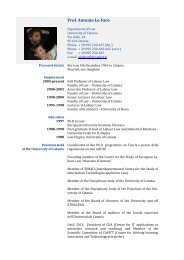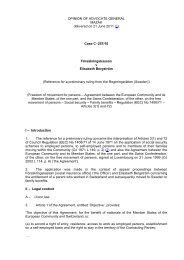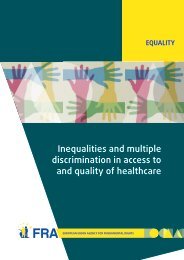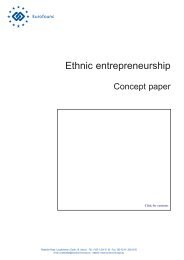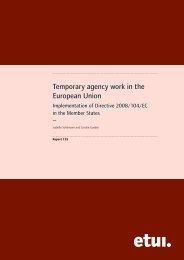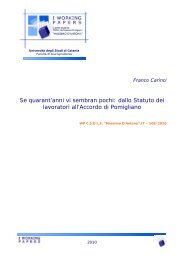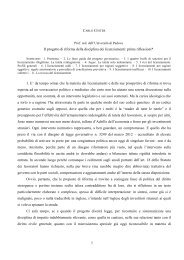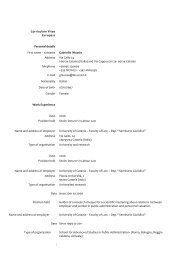Study on non-legislative initiatives for companies to promote gender ...
Study on non-legislative initiatives for companies to promote gender ...
Study on non-legislative initiatives for companies to promote gender ...
Create successful ePaper yourself
Turn your PDF publications into a flip-book with our unique Google optimized e-Paper software.
64 Gender equality <strong>initiatives</strong><br />
In Luxembourg enterprises receive the “Agrément Ministériel du Projet d’Acti<strong>on</strong><br />
Positive” (Ministerial Agreement <strong>for</strong> Positive Acti<strong>on</strong>s) after having underg<strong>on</strong>e an<br />
auditing process c<strong>on</strong>sisting of (i) an assessment of the current situati<strong>on</strong>; (ii) the elaborati<strong>on</strong><br />
of an acti<strong>on</strong> plan; and (iii) the implementati<strong>on</strong> of c<strong>on</strong>crete measures (the so called<br />
positive acti<strong>on</strong>s) <strong>to</strong> <strong>promote</strong> <strong>gender</strong> equality at the workplace. Finally, an evaluati<strong>on</strong><br />
and follow-up takes place. The different phases of the process are:<br />
• Prepara<strong>to</strong>ry phase: After the Committee <strong>for</strong> Positive Acti<strong>on</strong>s is in<strong>for</strong>med <strong>on</strong> the<br />
willingness of an enterprise <strong>to</strong> engage in the initiative, in<strong>for</strong>mati<strong>on</strong> meetings are<br />
held and a collaborati<strong>on</strong> c<strong>on</strong>venti<strong>on</strong> is signed between the company and the<br />
Ministry <strong>for</strong> Equal Opportunities. A working group is established including representatives<br />
of the company management, HR, representatives of the employees,<br />
equal opportunity commissi<strong>on</strong>er; of the MEGA as well as an external expert).<br />
• The first project phase refers <strong>to</strong> an analysis of the current situati<strong>on</strong> within the<br />
enterprise. The necessary in<strong>for</strong>mati<strong>on</strong> is – in co-operati<strong>on</strong> with an external expert –<br />
collected in meetings of Ministry representatives, company owners, shop stewards<br />
as well as working groups of employees and also by means of a standardised<br />
questi<strong>on</strong>naire <strong>to</strong> be filled in by the management and all employees. The results of<br />
this analysis are presented <strong>to</strong> the jury who then decides up<strong>on</strong> eligibility of the<br />
enterprise.<br />
• In the sec<strong>on</strong>d phase, i.e. the elaborati<strong>on</strong> phase, the external expert presents <strong>to</strong><br />
the enterprise/the working groups the results of the previous analysis al<strong>on</strong>g the<br />
three priority spheres of Positive Acti<strong>on</strong>s: equal treatment of men and women,<br />
equality of women and men in decisi<strong>on</strong> making, work-life balance. Together with<br />
the working group the expert then elaborates an acti<strong>on</strong> plan (including a set of<br />
Positive Acti<strong>on</strong>s, ways <strong>for</strong> their implementati<strong>on</strong> as well as time planning).<br />
• In the implementati<strong>on</strong> phase, the agreed Positive Acti<strong>on</strong>s are put in<strong>to</strong> practice,<br />
the Ministerial Agreement <strong>for</strong> Positive Acti<strong>on</strong>s is given, and the company agrees <strong>to</strong><br />
undertake an evaluati<strong>on</strong> after two or three years.<br />
• The last phase is the evaluati<strong>on</strong> and follow-up phase where adaptati<strong>on</strong>s may be<br />
effected. The analysis of the current situati<strong>on</strong>, as it had been carried out at the<br />
beginning of the auditing process, is repeated. The results are then compared and<br />
the progress is assessed.<br />
The design and implementati<strong>on</strong> of a positive acti<strong>on</strong> plan has been a prerequisite <strong>for</strong><br />
being labelled in Spain, <strong>to</strong>o. Meanwhile, such an equality plan is compulsory by law <strong>for</strong><br />
large <strong>companies</strong> with more than 250 employees.<br />
An example with sustainable success is the “Entidad Colaboradora en Igualdad de<br />
Oportunidades entre Mujeres y Hombres” (entity collaborating <strong>on</strong> equality of<br />
opportunities am<strong>on</strong>gst women and men), being a part of the programme Optima in<br />
Spain. It was awarded <strong>to</strong> <strong>companies</strong> which aim at balancing the presence of women<br />
and men am<strong>on</strong>gst employees, occupati<strong>on</strong>s and the management board, at facilitating<br />
the rec<strong>on</strong>ciliati<strong>on</strong> of work/family, at avoiding sexual harassment and at avoiding <strong>gender</strong><br />
n<strong>on</strong>-neutral manifestati<strong>on</strong>. The labelling process c<strong>on</strong>sisted of two elements:




